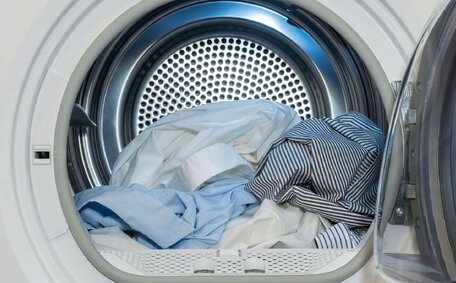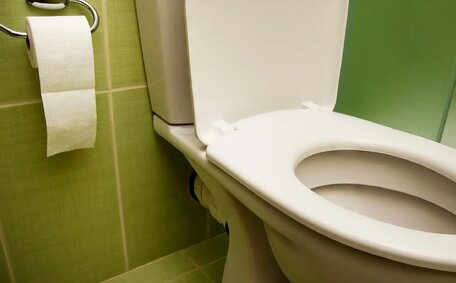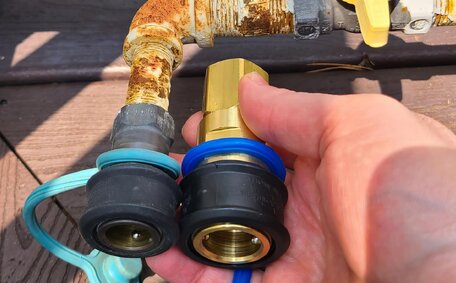Introduction to toilet blockages
Clogged toilets frequently disrupt proper flushing and drainage for many homeowners in Ryde, Sydney, leading to backed-up water, unpleasant smells, and potential bathroom overflows.
Blocked toilets can result from numerous causes, including structural issues with the drainage system and user errors, like flushing inappropriate items. Unchecked, toilet clogging can escalate into a messy, odorous situation that often requires professional intervention.
In this article, the expert team at Ryde Plumbing analyse the most common reasons your toilet might get blocked. We offer practical strategies for resolving and preventing blockages, and tips on identifying when to seek professional help.
Common causes of toilet blockages
Incorrect use
One of the most preventable causes of toilet blockages is plumbing vents being blocked by flushing unsuitable items down the toilet that should go in the bin. This includes:
- Baby wipes, cleaning wipes, paper towels
- Feminine hygiene products
- Dental floss
- Condoms
- Cotton balls & swabs
- Cigarette butts
- Kitty litter
Flushing materials other than toilet paper and human waste can snag inside the pipes and lead to blockages. Preventing clogs is best achieved by teaching everyone, especially children, the importance of correctly disposing paper products and non-flushable items.
Structural issues
Toilets can also have internal problems that impede flushing and drainage:
- Faulty flappers failing to create a tight seal and drain bowl contents
- Clogged traps due to mineral buildup and waste accumulation
- Tree roots infiltrating external drainage pipes and cracks
- Pipe fractures or misalignments allowing waste to snag
- Main sewer line blockages preventing outward flow
Spotting issues early via regular maintenance checks allows you to repair or replace worn parts before major clogging occurs.
When to call a plumber
Knowing when to call a professional can prevent further damage when confronting toilet clogs that a plunger can’t fix. If plunging fails or there’s a significant backup, specialists at Ryde Plumbing are equipped with the right tools and expertise to quickly handle your blockages.
Flushing inappropriate items
One of the most common yet preventable toilet problems your household can prevent is flushing items down the toilet that should go in the bin. This includes non-flushable wipes, paper towels, feminine hygiene products, and more.
When flushed, these thicker or non-biodegradable items cannot break down and cause issues up your pipes. They snag in your pipes and compromise your drain lines, clinging to fats, oils, and waste to form clogs over time.
It is crucial to instruct your household to flush only toilet paper and human waste, ensuring that nothing else exits through the toilet vent. Use bins for any other bathroom products, ensuring the plumbing vent remains clear. Installing signs or labels reminding users what not to flush can also help ingrain better habits in maintaining clear drain pipes.
For homes with young children, or if your toilet clogged frequently, keep the toilet lid closed when not in use as an added precaution.
Blockages from non-flushables may require professional drain clearing if they accumulate significantly. But better waste disposal practises can prevent this costly issue arising down the track.
Excessive toilet paper usage
Excessive waste toilet paper is a major contributor to drain and sewer line blockages.
How much is too much?
Typically, use only 4-6 sheets per visit or whatever is needed to prevent your toilet clogs. Finishing a roll of toilet paper in less than a week is often a sign that you should cut back to prevent waste accumulation in your home.
Risk of clogs & backups
An excessive amount of toilet paper causes bulky wads entering pipes. These can snag on imperfections and accumulate with other waste, before making their way down toilet drain. Over time, dense clogs form leading to drain blockages.
Reduce usage
Try educating household members, especially young kids, to use only necessary amounts. Consider installlng toilet paper dispensers restricting flow. And never flush paper towels or other substitutes which exacerbate issues.
Dispose of excess paper
Avoid using too much toilet paper; for necessary heavy use, dispose of extra wiping materials in bins rather than flushing. This prevents blocked plumbing while allowing proper hygiene and cleanliness.
By keeping toilet paper use moderate, households can avoid plumbing issues and keep costs down over the long term.
Structural and mechanical issues
There are several common causes clogged drains originate from internal toilet and plumbing components failing or becoming blocked:
Faulty flappers
Flappers are rubber seals within the tank that lift to allow flush water into the bowl. If a flapper is cracked or misaligned, it can lead to a weak flush due to an inability to form a proper seal, causing the water level to drop continuously.
Clogged traps
Every toilet has an S-shaped trap built underneath the bowl. Waste and mineral buildup can clog the toilets trap, preventing proper drainage.
Pipe issues
Internal pipes or external sewer lines can crack, fracture or misalign. This allows waste to catch and fail to move through the internal toilet pipes freely.
Call a plumber
If your toilet isn’t flushing correctly, a plumber can safely remove the clog without causing damage. They’ll also assess any faults with flappers, pipes, and perform repairs as needed to prevent toilet clog issues from recurring.
External factors
Beyond household misuse and internal plumbing issues, your local environmental factors can lead to external drainage problems that cause your toilet to clog:
Tree roots
Tree roots most likely cause over 60% of waste toilet and pipe blockages as they grow into cracks and gaps seeking moisture. Slowly infiltrating the line, tree roots form dense meshes impeding waste flow where low water can back up.
Main sewer line blocks
A house drain clog prevents outgoing waste from reaching the main system, leading to potential backup issues. With nowhere to go, water and waste can back up and affect the drains your home relies on for proper sewage disposal.
Heavy rains & floods
Excess stormwater funneling through roof drains into your sewer lines can cause temporary blocks and backups into your plumbing system until flood levels reside.
If your toilet repeatedly clogs without an obvious cause, inspecting your property’s outdoor drainage may reveal external blockages that need clearing.
Preventing and resolving toilet blockages
There are several key steps households can take to help prevent toilet blockages from occurring:
Only flush toilet paper
Remind household members to only flush toilet paper and human waste, disposing all other items in the bin to avoid drain line blockages.
Use toilet paper moderately
Don’t use excessive amounts of toilet paper. To prevent overburdening the system, use a moderate amount of toilet paper, about 4-6 sheets per use.
Install water-efficient toilets
Contemporary low-flow toilets outperform older models by providing a strong flush while using less water. Upgrading to low flow toilets saves water and helps prevent waste sticking.
Clean the toilet trap regularly
Use a bottled liquid drain cleaner monthly to clean the blocked vent pipe and break up grease and waste accumulation in the toilet trap, keeping it flowing freely.
Fix leaks and faults early
Address issues like flapper leaks and pipe cracks, similar to kitchen sink maintenance, through regular plumbing checks. This prevents more extensive blockages forming.
Try a plunger
For minor clogs, effectively use a toilet plunger with steady, firm movements over the drain opening.
Use a closet auger
For deeper clogs that persist, insert the hooked end of a toilet auger down the toilet bowl and twist gently. Bringing back material through the drain pipe confirms clearing.
If DIY efforts to unclog your toilet fail and septic tank backup persists, call plumber Ryde Plumbing on 1300 349 338. Our licensed technicians have the expertise to diagnose and resolve blockages, ensuring your toilets function optimally.
Proper toilet usage and maintenance
Correct toilet use and regular maintenance are key to preventing blockages and ensuring longevity.
Do not flush paper towels, wipes, feminine hygiene items, or other non-decomposable trash that could clog the toilet. Ensure only human waste and toilet tissue are flushed to prevent blockages.
Use 4-6 sheets of toilet paper
To avoid blockages, regulate toilet paper usage and refrain from flushing excessive amounts. Use only what you need for proper hygiene and send the rest to the trash.
Check for leaks
Listen for running water and fix minor flapper leaks early before they lead to low water pressure and overuse of water.
Clean the bowl regularly
Weekly cleaning with a toilet brush and gentle cleaner prevents mineral scale buildup from hard water.
Monthly maintenance
Pour a bottled drain maintainer down the toilet monthly to break grease and waste, ensuring water down your system flows smoothly.
Adhering to these best practices for proper use and maintenance will significantly reduce the likelihood of toilet blockages. However, if issues arise, contact the skilled team at Ryde Plumbing at 1300 349 338 for dependable assistance.
When to call a professional plumber
While minor toilet clogs can often be cleared with basic DIY methods, there are scenarios where calling a professional plumber is strongly advised:
Recurring blockages
If your toilet consistently re-clogs despite clearing attempts, it may indicate an underlying problem that requires diagnosis. Ongoing blockages could signify pipe damage or sewer infiltration, issues best addressed by a professional plumber.
Overflow risk
If water begins to spill into toilet bowl and overflow, call a 24/7 plumber like Ryde Plumbing immediately. Toilet overflow can lead to significant water damage that must be addressed immediately.
Drain augering fails
Attempting to plunge or auger a toilet blockage yourself risks damage to sewer pipes if done incorrectly. If DIY efforts fail to clear the clog, a professional has specialised snakes that reach further into pipes without risk of punctures or leaks.
Sewer line issues
Backups from potential house drain sewer issues or external pipe and sewer main complications typically require council coordination, which plumbers can assist with through proper diagnosis and repair facilitation.
Don’t hesitate to call the team at Ryde Plumbing on 1300 349 338 if faced with an emergency overflow or failed self-attempts to clear your blocked toilet. Our licenced technicians have the expertise to quickly rectify clogs and identify any underlying issues.






